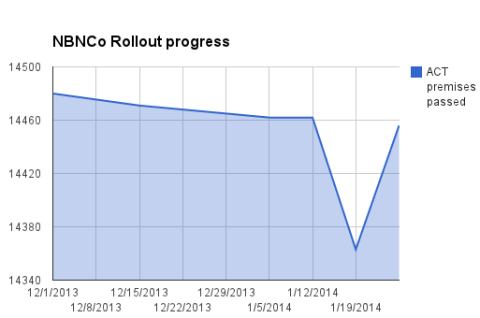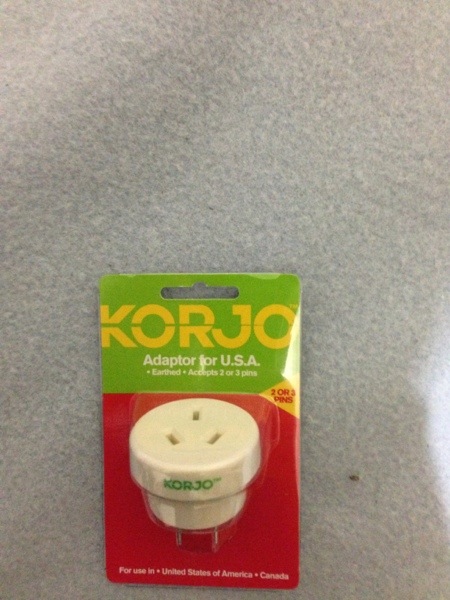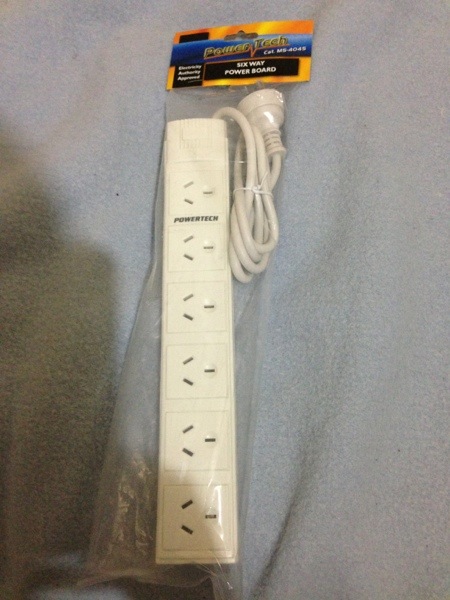Archive for January 31st, 2014
The National Broadband Network regularly posts on its website updated figures regarding the number of households to which the NBN is available. Michael Still (who, unlike me, is a proponent of the NBN) has been tracking these numbers and has found something odd…the NBN seemingly no longer reaches 24 houses in the ACT that it reached two months ago.

NBN rollout in the ACT December 2013 – January 2014. Image credit Michael Still
On the face of it, the numbers don’t make sense for two reasons:
1) As the project is built, it should continue to reach an increasing number of houses. If more houses were being knocked down in Canberra than being built, the decline might make sense, but then you’d have to wonder whether it would be better to prioritise the rollout in places which aren’t being demolished.
2) That amazing drop late week which mostly undid itself this week. The numbers are dodgy. Something is very wrong with the way they are being calculated.
This leads me to the inevitable question of “how many homes have actually been passed by the NBN?”. It’s possible that there was an overestimation of the number and they are now slowly auditing and correcting it, or it could be a more sinister and deliberate exaggeration of the numbers from before the federal election with a gradual correction of the numbers so as to not raise suspicions with a sudden drop.
This all leaves me wondering how much it is actually costing per house passed, and how much more over-budget this places the project than we already knew about. The NBN seems to be quickly devolving in to another TransACT rollout…over budget, behind schedule, unlikely to ever reach all of the people it initially said it would, and likely to risk leaving people high and dry if it collapses under its own weight or doesn’t get bailed out somehow.
The inescapable conclusion is that this should have been left to the private sector to do in a cost-effective manner in response to consumer demand. The rollout wouldn’t have been as quick (not that you could call the NBN’s rollout quick) and the speeds might not have been as high as offered by NBN Co. initially, but at least it would have been done in a responsible and commercially sustainable manner which didn’t require tens of billions of taxpayer dollars (perhaps close to $100 billion) at a time when the federal government really can’t afford it.
Samuel
January 31st, 2014 at 07:22pm
One of the more interesting parts of arranging my trip has been what devices will and will not accept the US voltage (they use 110v while Australia uses 240v).
I plan on taking my laptop, phone, camera, electric razor, and electric toothbrush. They (or the more precise, their respective chargers) will all accept 110v except for the toothbrush. Unfortunately finding one in Australia which will accept 110v is quite difficult, and I don’t really like the ones which take AA batteries as they seem to run out of useful power pretty quickly. Taking a heavy and expensive transformer is not feasible either, and I’m not keen on buying a toothbrush over there which will have the same problem when I bring it back to Australia.
It turns out that Braun do make US chargers for their toothbrushes but don’t usually sell them outside the US (given how small the charger is, I doubt it has room for a multi-voltage power supply). I was able to find one on eBay, however as it is located in the US, it would probably reach my PO Box after leave Australia. Thankfully the nice people at the Quality Inn Petaluma were willing to accept and hold the parcel for me.
The other consideration is the plug style. Even if an Australian appliance can take 110v, it still requires a US style plug. Adaptors for this are common and cheap.


Korjo power plug adaptor for Australian plugs in US sockets
I’m taking two adaptors with me. This isn’t enough for all of my appliances, but I have a reason for that. One will go in the bathroom for my razor (which requires mains power to operate…it is not a chargeable one) and another for the main room. I’m only taking one for the main room as I can’t guarantee that there will be more than one powerpoint in all hotel rooms, and why take half a dozen adaptors when I can take one of these?

A cheap and basic powerboard
Plug the adaptor in to the wall socket. Plug the powerboard in to the adaptor, and plug my Aussie appliances in to the Aussie-style slots on the powerboard.
I went for a cheap and basic powerboard because it won’t have any problems with a foreign voltage as long as it is not being used to draw a large amount of power. A powerboard with surge protection or other fancy circuitry (such as on/off functions controlled by remote control, as I saw with one powerboard) could have problems with a foreign voltage, whereas a cheap and simple one shouldn’t have any issues.
So, with that done, I am almost completely ready to go with a bit over a week until I depart.
Samuel
January 31st, 2014 at 12:14pm
I nearly fell off my chair the other night when I heard a radio PSA from the US Government’s Environmental Protection Agency (the massive bureaucratic nightmare that it is) which spent 30 seconds advising listeners that vacuuming the floor of your house is a good idea. Good heavens Uncle Sam’s overbearing cousin…really? I would never have guessed.
But then, when I thought it couldn’t get stranger, Jim Ball brought my attention to this bizarre idea from the gigantic unelected government known as the bureaucrats who seem to wield most of the power in the European Union. They’ve decided to take decisive action on that most pressing issue: overpowered vacuum cleaners.
Under European Commission ‘eco’ rules that will come into force next September, the power of new vacuum cleaners must not exceed 1,600 watts.
That figure will be lowered further to 900 watts by 2017. Current cleaners boast an average of 1,800 watts.
The move angered manufacturers, who say it will do nothing to make cleaners more environmentally friendly and will simply reduce efficiency in the home.
[..]
Critics say cleaners satisfying the new rule may use less power, but householders will have to use them for longer so they are likely to use the same amount of electricity in the long run.
(h/t Lucy Osborne, Daily Mail)
So people will either spend double the amount of time cleaning, reducing productivity, or they’ll live in dirtier homes. Maybe the EU will be able to put together a European version of the EPA’s radio spot…at least people will have something to listen to while they spend those extra hours cleaning then.
Samuel
January 31st, 2014 at 06:35am



